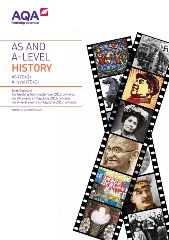2C The Reformation in Europe, c1500–1564 (A-level only)
This option provides for the study in depth of a formative period of early modern history during which the Catholic Church faced a range of challenges which led both to the emergence of a new ‘protestant’ order and ultimately to a spiritual regeneration within the Catholic Church itself. It requires an exploration of concepts such as piety, humanism, Lutheranism, Calvinism, Zwinglism and Catholicism as well as an in-depth understanding of more specific religious practices and ideas in the context of the 16th century such as the mass, baptism, purgatory, heaven and hell. It encourages students to reflect on issues such as the relationships between the spiritual and political role of the Church and the place of religion in society.
Part one: the origins of the Reformation, c1500–1531
The condition of the Church, c1500–1517
- The Church: secular power and influence; the clerical hierarchy; Church courts; influence in government; influence on daily life
- The Church: religious power and influence; Church doctrine, teachings and belief; the sacraments, salvation, the role of the priest and of 'good works'
- Criticism of the Church; Pope Alexander VI; papal and clerical corruption; humanism: Colet, More and Erasmus; heresies and anti-clericalism
- Church finances, indulgences, popular piety and the extent of demand for reform
The challenge of Luther, 1517–1521
- The Holy Roman Empire, its government, condition and social composition: emperor, princes, knights, towns and electors; urban workers and peasants
- Martin Luther: influences on early life; the content and impact of the 95 Theses
- Disputations; the development of Lutheran thought; publications and the influence of printing
- Excommunication and Diet of Worms: attitude of Catholic Church hierarchy; Emperor and Princes; the imperial edict and the protection of Frederick the Wise
The Protestant challenge, 1521–1531
- The spread of radical reformation: Carstadt and the Zwickau prophets; Luther's relations with radicals and humanists
- The development of protestant doctrine: Luther, Melancthon and Zwingli
- The revolt of the Imperial Knights and the peasants' war: causes and outcomes; part played by Lutheranism and Luther's reaction; Luther's pamphlets of 1525; imperial diets, princes and cities; Lutheran-Catholic negotiations including the 1530 Augsburg Confession
- The Reformation in the Swiss Confederacy; the Kappel wars; support and opposition; Lutheran-Zwinglian negotiations; the state of the Church by 1531
Part two: Reformation Europe, 1531–1564 (A-level only)
The expansion of the Reformation, 1531–1541 (A-level only)
- The geographical and social expansion of Lutheranism: Melancthon; Luther; doctrine and leadership; position and problems of Charles V
- The development of the radical reformation; Anabaptism and the Münster rebellion
- Religious division in Germany and the formation of the Schmalkaldic league
- The Diet of Regensburg and state of the Church by 1541
The second wave of Protestant Reform, 1541–1564 (A-level only)
- Calvin: influences on early life and the evolution of doctrine; publications; early reform work and ministry in Strasbourg
- The practice of Calvinism in Geneva: support and opposition; the impact of his relationship with Servetus; Calvin and Luther: attitudes, similarities and differences; Calvin's authority and concordat with Zurich and Geneva churches
- The spread of Calvinism: France, Scotland, Netherlands, Germany, Poland and eastern Europe
- Religious War in Germany; the death of Luther; the Peace of Augsburg and the abdication of Charles V; principles and problems of the Peace of Augsburg
The Catholic Reformation, 1531–1564 (A-level only)
- Papal revival: Paul III; report into the state of the Church; the Roman Inquisition; Paul IV and Pius IV
- Spiritual regeneration: New Religious Orders; Loyola and the Jesuits; beliefs, discipline and influence
- The Council of Trent: the three sessions; doctrine and the extent of reform
- The impact of reform by 1564; the response of monarchy, clergy and laity; geographical variation; the spiritual and political role of the Church
